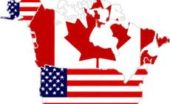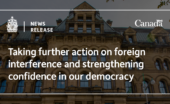Molly Minturn - My family is heartbroken to share that my father died in surgery on Monday, Feb. 10. It…
Wednesday Night #2044
Written by Diana Thebaud Nicholson // May 19, 2021 // Wednesday Nights // Comments Off on Wednesday Night #2044
The first items on our agenda are understandably Quebec-centric starting with the only good news in recent days, the lifting of the curfew and opening of outdoor dining on May 28 with the promise that other restrictions will be lifted soon after and masks will no longer be mandatory in most situations by the end of August. All provided the population keeps getting vaccinated and doesn’t do anything stupid – a big caveat in light of some recent experiences.
But the big news in Quebec concerns Bill 96 and its impact on the Anglophone and Allophone minorities.
Proposed Bill 101 Overhaul Disregards Fundamental Human Rights and Freedoms
On Tuesday, Justin Trudeau stated that Quebec can modify part of the Canadian Constitution unilaterally and that has opened a can of (constitutional) worms “Prime Minister Justin Trudeau’s assertion that Quebec can unilaterally amend the Constitution to advance its plans to bolster the use of French is being disputed by some constitutional experts, who say the proposal would have to be approved by Parliament.”
Trudeau’s comments on Constitution spark backlash among Quebec anglos
“This is a deeply troubling trend,” QCGN president Marlene Jennings tells federal Justice Minister David Lametti. [She] abruptly cancelled her participation in a meeting between her staff and the staff of federal Justice Minister David Lametti on Tuesday.
Erna Paris in The Globe & Mail:
After decades of playing Charter chicken, Canada is now home to what is effectively an illiberal democracy. Commenting on this, Doug Sweet has written:
“This, above all else, is the fatal flaw in the current Quebec government’s latest attempt to “protect” the French language through legislation that the government has decided needs protection from the threat of court challenges under the Canadian Charter of Rights and Freedoms (as was the case with its infamous Bill 21 which forbids the wearing of conspicuous religious symbols, like hijabs, by certain government employees, like teachers). That there appears to be at least some measure of active support for this latest proposed law, or at least shameful acquiescence on the part of a wide variety of political parties more interested in their next elections rather than in protecting some basic human rights is depressing. The notwithstanding clause is for cowardly governments who know what they are doing violates fundamental freedoms we are all supposed to enjoy in this country.”
André Pratte: Justin Trudeau’s constitutional capitulation
Recognizing Quebec as a nation is not just about Quebec, and it’s mind-boggling and worrisome the prime minister does not acknowledge this.
Andrew Coyne has it right: Quebec’s anglophone minority is a target, once again – and no one is coming to the rescue
Last Thursday’s Webinar with lawyers Marion Sandilands and Julius Grey The Notwithstanding Clause: its impacts, history and future
is now online and for all who were not able to view it live, it is a must see.
Andrew Caddell‘s column this week Montreal Canadiens, no more the ‘Flying Frenchmen’ takes up a sensitive matter: “Last week, as the Quebec government tabled a retooled version of the French Language Charter, the province was seized with a cultural crisis. For the first time in its 112-year history, the Montreal Canadiens did not have a Quebec-born player on the ice. The team with the iconic CH sweater, whose nickname was the “Flying Frenchmen,” did not ice one Québécois player. Veterans Phillip Danault and Jonathan Drouin were not on the roster.”
The situation in Israel Palestine and Gaza shows no sign of abating
Unless we can believe the late-breaking news: Live Updates: Signs That a Gaza Cease-Fire May Be Near, as Diplomatic Pressure Grows
Earlier on Wednesday
Rockets fired from Lebanon as Israel expands airstrikes and ceasefire efforts intensify
President Biden and other world leaders intensified calls to end the conflict, while Hamas and Israel suggested that a halt may come soon.
Israeli Prime Minister Benjamin Netanyahu vowed Wednesday to press ahead with a fierce military offensive in the Gaza Strip, pushing back against calls from the United States to wind down the operation that has left hundreds dead.
Netanyahu’s tough comments marked the first public rift between the two close allies since the fighting began last week and could complicate international efforts to reach a ceasefire. His pushback also plunges the pair into a difficult early test of the U.S.-Israel relationship.
And there is this: Netanyahu does not rule out taking over Gaza Strip to stop Hamas attacks
Jeremy Kinsman and Larry Haas also focus on Israel/Palestine this week. Larry Haas has a nuanced view of President Biden’s role.
As everyone has their own sources of news and information, we will only suggest the following analyses
Natan Sachs on the Brookings blog: The perfect storm for Israelis and Palestinians
and
Yossi Klein Halevi in the NYT: Israel’s Real Existential Threat
Another view (from November 2014, following the last “Gaza war”) What the Media Gets Wrong About Israel The news tells us less about Israel than about the people writing the news, a former AP reporter says.
The other dominant news concerns the U.S. and the obdurate opposition of the Republicans -in thrall to Donald Trump- to anything and everything proposed by the Biden Administration.
As you know, I am a faithful follower of Heather Cox Richardson. Her blog of May 14 is one of the most depressing reads about the Republican Party that I have seen as she details why she believes that “Today’s vote [electing Elise Stefanik, Trump’s choice for conference chair, to replace Liz Cheney] confirmed that the leaders of the current Republican Party are willing to abandon democracy in order to save the country from what they call “socialism.” But what Republicans mean when they say “socialism” is not the political system most countries recognize when they use that word: one in which the people, through their government, own the means of production. What Republicans mean comes from America’s peculiar history after the Civil War, when new national taxation coincided with the expansion of voting to include Black men.”
Last Thursday’s event organized by Andrew Caddell and Kyle Matthews The “Fourth Option”: how does Canada reduce its dependence on China? was excellent and pointed to the work of the Asia Pacific Foundation including Anti-Asian Racism in Canada: Where Do We Go from Here? and this important piece International Student Flows from Asia to Canada Facing Short-term, Long-term Disruptions
“how can we widen the scope of our international education focus, looking not just at how to adapt to changes in international student numbers, but also at how to ‘internationalize’ education for Canadian students? … The current moment is an opportunity for Canada to embrace a more full-spectrum internationalization of its higher education sector, building on the important objectives identified in Canada’s recent International Education Strategy (2019-2024). This strategy made a commitment not only to diversifying sources of international students – including, not least of all, several large countries in Southeast Asia – but also to making sure that Canadian students could get study and work experience in places that will be key to Canada’s trade diversification, especially in Asia.
For discussion at another WN.
There have been non-stop favourable reviews and interviews for Lisa Napoli‘s book Susan, Linda, Nina & Cokie: The Extraordinary Story of the Founding Mothers of NPR
The trailblazing women behind 50 years of extraordinary journalism at NPR
For NPR’s 50th anniversary, PBS’ Judy Woodruff spoke with author Lisa Napoli and Susan Stamberg about how women turned NPR into one of the U.S.’s most popular media outlets. Lisa notes that the producer & director on this segment were both women, too.
As NPR celebrates its 50th anniversary, Canada’s international broadcast service from the English language team of Radio Canada International has come to an end. “A manager will now oversee the staff of eight who will adapt curated stories from the CBC and Radio-Canada into Mandarin, Arabic, and Spanish, along with Punjabi and Tagalog. They will also create a weekly podcast, with field reports in Mandarin, Arabic, and Spanish and Punjabi. An effort was and is being made by the RCI Action Committee to preserve and even expand the service which has garnered great support from a former prime minister, former diplomats and many academics, but the end date has come. This is the last entry by the RCI English section.”
Events
Wednesday, May 19
Now available
Robotics for all with Pedro Gregorio
What is next for the rapidly growing satellite market and Pedro’s unceasing innovation in robotics!
4:30pm
Webinar
QCGN presents The PLQ’s 27-point plan, explained
Will be posted online on Thursday. May 20
Varia
Explainer: What Beijing’s new crackdown means for crypto in China
Chinese regulators have tightened restrictions that ban financial institutions and payment companies from providing services related to cryptocurrencies, marking a fresh crackdown on digital money.
Compared with a previous ban issued in 2017, the new rules greatly expanded the scope of prohibited services, and judged that “virtual currencies are not supported by any real value”.
UFOs regularly spotted in restricted U.S. airspace, report on the phenomena due next month
Bill Whitaker reports on the regular sightings of unidentified aerial phenomena, or UAP, that have spurred a report due to Congress next month.
After decades of public denial the Pentagon now admits there’s something out there, and the U.S. Senate wants to know what it is.
Why Millennials Can’t Grow Up
Today’s economic conditions are not just holding Millennials back. They are stratifying them, leading to unequal experiences within the generation as well as between it and other cohorts.
Truth, lies and honey
We hear many tales about bees and honey. Even economists may base their theories on fantasy hives. Dieticians can do the same when promoting the imaginary health benefits of honey, and then there’s the honey itself. It should be one of the purest products of nature, yet what we find on supermarket shelves can be cut with syrup, tainted by antibiotics, or sourced from China despite a label that claims otherwise. So let’s take a worldwide tour of the honey trade, which oscillates between truth and tall tales, with a few tips for your coming purchases.



